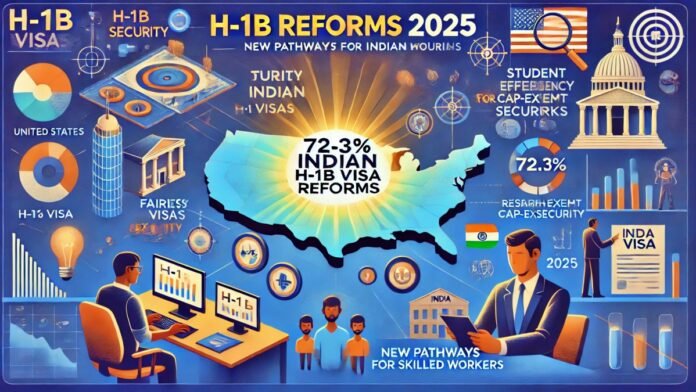
Key Highlights:
- Enhanced Flexibility: New rules simplify F-1 to H-1B transitions and expand exemptions for research-based roles.
- Focus on Fairness: Employers must prove job authenticity under stricter guidelines.
- Indians Dominate: With 72.3% of H-1B visas granted in 2023, Indian professionals stand to gain the most.
- Streamlined Processes: Revised definition of “specialized work” ensures a logical connection between degrees and job roles.
New Delhi: The United States government has announced a series of transformative changes to the H-1B visa program, effective January 17, 2025. These updates, introduced by the Department of Homeland Security (DHS) and US Citizenship and Immigration Services (USCIS), aim to enhance fairness, transparency, and efficiency in hiring skilled foreign workers.
Indians, who form the largest group of H-1B visa holders, are set to benefit significantly from these reforms. In 2023 alone, 72.3% of the 386,000 H-1B visas issued went to Indian nationals, primarily in the tech sector.
Key Changes to the H-1B Visa Program
- Redefined ‘Specialized Work’
The concept of “specialized work” has been revised to ensure greater inclusivity. The new rule requires a logical relationship between the applicant’s degree and job role, replacing the earlier, stricter criterion of a “direct relationship.”
- Implication: Opens up opportunities for professionals with diverse academic backgrounds to qualify for H-1B jobs.
- Streamlined F-1 to H-1B Transition
International students in the US on F-1 visas will now benefit from an automatic extension of their student visas until April 1, ensuring uninterrupted legal status and work authorization during the H-1B application review period.
- Implication: Reduces uncertainty for students transitioning to employment in the US.
- Expanded Cap-Exempt Roles
Non-profit organizations and government research bodies are now eligible for H-1B cap exemptions, even if research isn’t their primary activity. Employees dedicating at least 50% of their time to furthering the organization’s purpose also qualify for exemptions.
- Implication: Facilitates the hiring of foreign talent in critical research and development roles.
- Enhanced Employer Accountability
Employers petitioning for H-1B visas must now demonstrate the authenticity of job roles. DHS will verify the availability of legitimate specialty jobs and may request additional documentation to confirm compliance.
- Implication: Strengthens program integrity by curbing fraudulent job postings.
Impacts on Indian Professionals
With Indians already dominating the H-1B landscape, the reforms are expected to further bolster their representation. The revised rules provide:
- More pathways for skilled Indian graduates to secure employment in the US.
- Increased opportunities in research and academic roles, particularly for those affiliated with exempt organizations.
US Administration’s Vision
The DHS emphasized two primary objectives in modernizing the H-1B program:
- Clarifying Program Requirements: Ensuring the visa process is straightforward and accessible to all stakeholders.
- Boosting Flexibility: Allowing employers to better retain skilled workers while enhancing transparency and security.
Reactions and Future Outlook
Industry experts and stakeholders have largely welcomed the reforms, seeing them as a move toward balancing workforce needs with fair employment practices. Indian tech professionals, who form the backbone of Silicon Valley, are poised to gain a competitive edge.
While the changes are expected to streamline operations, employers must now adhere to stricter documentation requirements, ensuring greater accountability.
The H-1B reforms mark a significant shift in US immigration policy, emphasizing both inclusivity and program integrity. For Indian professionals, these changes promise enhanced opportunities and smoother pathways to employment in one of the world’s largest economies. As the new rules take effect, the spotlight remains on how they reshape the global talent landscape.



















































